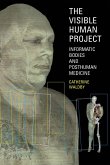This book is concerned with the provision of health information remotely via the latest communications technologies. The rapidly aging population has led governments to seek more effective methods of maintaining high standards of public health through the cultivation of healthy living, as well as improved and more efficiently delivered health advice and diagnostic services. Experiments with remote provision of health information and transactional services have been piloted to assess in this context the efficacy of new communications technologies, such as personal computers linked to the Internet, interactive digital television in the home, and electronically networked touch-screen kiosks in public locations. Such developments represent part of a wider agenda--through electronic government--to cultivate more dynamic democracies and involve citizens of a time of growing political alienation. The impact of such developments can only properly be established through systematic empirical research. This book examines what has been learned from research-based evaluations of digital health projects. It draws upon research from different parts of the world and offers an up-to-date review of the literature in this field. It also presents a detailed account of recent research carried out in Britain on the effectiveness of government-sponsored pilot health information, advice and transactional services provided via kiosks, the Internet, and interactive digital television. It considers the effectiveness of these communications technologies in relation to a range of distinct applications, their use by the public and perceived usefulness and authority, and the potential of remote health delivery to support or supplant more traditional and direct forms of health diagnosis and treatment. The book will be of interest to those involved in the academic study of digital media developments, e-government and remote health, as well as to policy-makers and practitioners working in these rapidly growing fields of endeavor.
Hinweis: Dieser Artikel kann nur an eine deutsche Lieferadresse ausgeliefert werden.
Hinweis: Dieser Artikel kann nur an eine deutsche Lieferadresse ausgeliefert werden.








